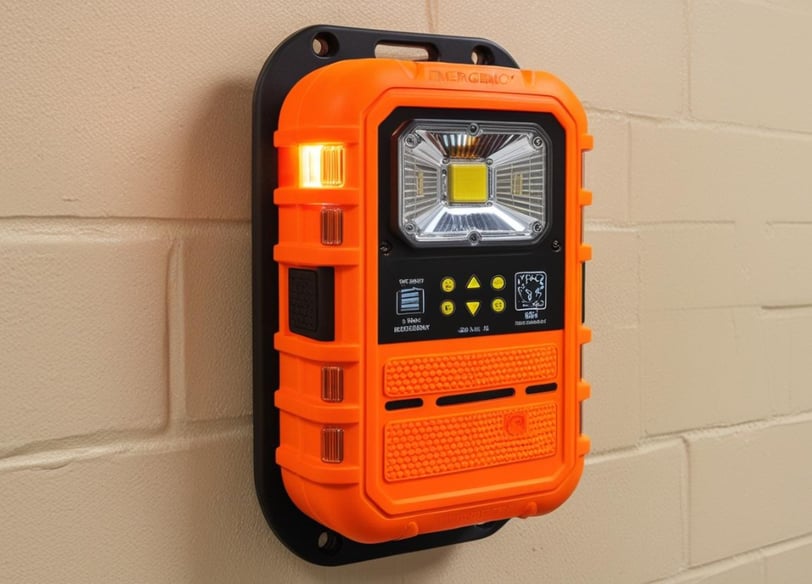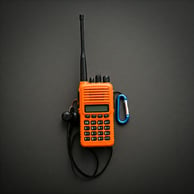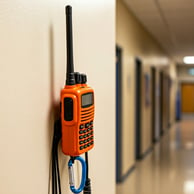Our School Contact Devices
Blueprint for a Physical Devices for Schools
12/27/20242 min read


1. Wall-Mounted Device Design
Dimensions: 12" x 8" x 4"
Material: Durable polycarbonate casing with reflective coating for visibility.
Mounting: Secure wall-mount brackets compatible with concrete, brick, or drywall.
Features:
High-contrast emergency buttons with LED backlighting.
Speaker and microphone integrated for announcements and two-way communication.
Tamper-proof locking mechanism to prevent unauthorized access.
2. Handheld Device Design
Dimensions: 6" x 3" x 1"
Material: Rubberized casing with textured grips for slip resistance.
Color: High-visibility bright orange with reflective accents.
Features:
Rechargeable battery with a 72-hour runtime and solar panel for emergency charging.
Waterproof and shockproof casing (IP68 rating).
LED beacon with strobe functionality and multi-tone siren.
Dedicated buttons for emergency, communication, and navigation.
3. Core Emergency Functionality
Notification System:
Single-button activation for predefined emergency protocols (e.g., lockdown, fire alarm).
Silent alert mode with vibration and discreet LED notification for sensitive emergencies.
Two-Way Communication:
Integrated microphone and speaker for real-time communication with authorities.
GPS-enabled distress signal for location tracking.
Geofencing Integration:
Trigger alerts if devices exit or enter designated geofenced areas (e.g., campus boundaries, restricted zones).
Automatically activate lockdown protocols if unauthorized devices breach the geofenced perimeter.
Provide GPS-based alerts for emergency responders and school security teams.
Drill Mode:
Toggle for simulating emergencies during training sessions.
4. Day-to-Day Functionality
AI Voice Assistant:
Responds to common queries such as classroom locations and schedules.
Supports multiple languages for diverse student and staff populations.
Attendance and Navigation:
RFID or QR code scanning for attendance tracking.
Turn-by-turn navigation assistance for visitors or new staff.
Content Filtering:
Robust security protocols to ensure appropriate and safe interactions.
5. Connectivity and Analytics
Offline Capabilities:
Access to pre-programmed protocols and emergency activation without an internet connection.
Wi-Fi and Bluetooth:
Seamless integration with school networks for real-time updates and data syncing.
Geofencing Analytics:
Track device movement within geofenced areas to monitor compliance and improve safety measures.
Generate reports on zone breaches, device activity, and movement patterns for enhanced decision-making.
Data Insights:
Usage statistics and analytics for optimizing device placement and improving safety protocols.
6. Accessibility Features
Inclusive Design:
Braille labels and audio feedback for visually impaired users.
Large, tactile buttons for easy operation.
Vibrating alerts for users with hearing impairments.
7. Maintenance and Support
Training:
Comprehensive training programs for staff and students.
Quick-reference guides and user manuals.
Maintenance Plan:
Annual maintenance checks and software updates.
Remote diagnostics and 24/7 technical support.
Warranty:
3-year warranty covering hardware and software malfunctions.
8. Implementation Scenarios
Scenario 1: Emergency Drill
A school initiates a lockdown drill. Wall-mounted devices provide instructions while handheld units confirm staff and student locations.
Scenario 2: Visitor Assistance
A visitor uses the AI assistant to navigate to a classroom and learn about the day’s schedule.
Scenario 3: Field Trip Safety
A handheld device with satellite connectivity is used during a field trip to report an emergency in an area without cellular service.
Geofencing alerts staff if any device exits the designated field trip zone.
Scenario 4: Perimeter Security
Geofencing triggers an alert to security teams when an unauthorized individual breaches the campus boundary or enters a restricted zone.
Scenario 5: After-Hours Alert
A janitor uses the wall-mounted device to report a fire hazard, triggering an alert to local emergency services and school administrators.




Connect
Enhancing communication through innovative AI solutions.
Engage
805-669-8683
© 2024. All rights reserved.


